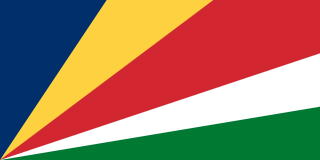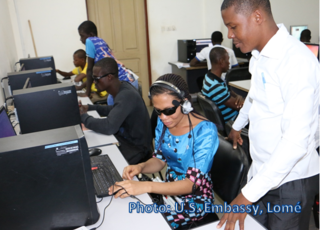
The Paralympic Games or Paralympics, also known as the Games of the Paralympiad, is a periodic series of international multisport events involving athletes with a range of disabilities. There are Winter and Summer Paralympic Games, which since the 1988 Summer Olympics in Seoul, South Korea, are held almost immediately following the respective Olympic Games. All Paralympic Games are governed by the International Paralympic Committee (IPC).

The Paralympic sports comprise all the sports contested in the Summer and Winter Paralympic Games. As of 2020, the Summer Paralympics included 22 sports and 539 medal events, and the Winter Paralympics include 5 sports and disciplines and about 80 events. The number and kinds of events may change from one Paralympic Games to another.

The Convention on the Rights of Persons with Disabilities is an international human rights treaty of the United Nations intended to protect the rights and dignity of persons with disabilities. Parties to the convention are required to promote, protect, and ensure the full enjoyment of human rights by persons with disabilities and ensure that persons with disabilities enjoy full equality under the law. The Convention serves as a major catalyst in the global disability rights movement enabling a shift from viewing persons with disabilities as objects of charity, medical treatment and social protection towards viewing them as full and equal members of society, with human rights. The convention was the first U.N. human rights treaty of the twenty-first century.

Para swimming is an adaptation of the sport of swimming for athletes with disabilities. Para swimmers compete at the Summer Paralympic Games and at other sports competitions throughout the world. The sport is governed by the International Paralympic Committee. Both men and women compete in para swimming, racing against competitors of their own gender. Swimming has been a part of the Paralympic program since the 1960 Summer Olympics in Rome, Italy.

The Seychelles made their Paralympic Games début at the 1992 Summer Paralympics in Barcelona, with just two representatives. Cyrl Charles competed in swimming, while Elvis Victor entered the shot put. Neither man won a medal. Cyrl Charles also competed in 2016, aged 53.
South Africans with disabilities constitute a sizeable proportion of the population, and their status in society is extremely varied in a developing nation with socio-economic inequality and a history of apartheid. Wealthy city dwellers have access to a wide range of assistance, whereas the poor struggle for even the basic necessities of life.
The incidence of disability in Costa Rica is about 10.5% of the population. The country is a party to the United Nations Convention on the Rights of Persons with Disabilities since 2008.
There are 26.8 million people with disabilities in India according to the 2011 census of India, while other sources have offered higher estimates. India is a party to the United Nations Convention on the Rights of Persons with Disabilities. Legislation that affects people with disabilities in India includes the Rights of Persons with Disabilities Act, 2016, the Mental Health Care Act, 2017, the National Trust Act, 1999, and the Rehabilitation Council of India Act, 1992. People with disabilities in India are faced with negative social attitudes in the wider population.

People with disabilities in Pakistan are seen differently than in most Western countries due to cultural and religious beliefs. The lack of accurate epidemiological evidence on disabilities, insufficient resources, weak health care facilities and worker shortages are major obstacles to meeting the needs of disabled Pakistanis.
In Japan, a person with a disability is defined as: "a person whose daily life or life in society is substantially limited over the long term due to a physical disability or mental disability". Japan ratified the United Nations Convention on the Rights of Persons with Disabilities (CRPD) on 20 January 2014.
Many disabled people face poor provision of facilities, and disabled children are commonly institutionalized, even though Russia is a party to the United Nations Convention on the Rights of Persons with Disabilities, having signed the treaty on 24 September 2008, and ratified it four years later, on 25 September 2012.
Reliable information about disability in North Korea, like other information about social conditions in the country, is difficult to find. As of 2016, North Korea is a signatory to the United Nations Convention on the Rights of Persons with Disabilities.
Peruvians with disabilities constitute 5.2% of the population. 52.1% of disabled people are women. 40.5% of disabled Peruvians have a primary or better education. 76.8% are not economically active they have an unemployment rate of 12.1%. Of those Peruvians with disabilities who do work, 58.3% are self-employed.

Disability in Yemen has been increasing over time, especially because of increased conflict in the area. Disabled people in Yemen face many challenges due to poverty, lack of accessible infrastructure, gender segregation and more. The government of Yemen has passed laws to help protect the rights of disabled people in their country, but not all laws are equally enforced.
Disability affects many people in Zimbabwe in both rural and urban areas. In spite of services provided by the government, philanthropists and welfare agencies, people with disabilities and their families often face several barriers. Philanthropist, Jairos Jiri, started services for people with disability in Zimbabwe in the 1940s. He is regarded as the father or founder of disability work in Zimbabwe.

People with disabilities in Togo face many unique challenges. Disability in Togo is often seen as a curse or sign of witchcraft, leading to poor outcomes for people with disabilities. Accessibility in the country is lacking. However, Togo has signed onto the UN Convention on the Rights of Persons with Disabilities and has created plans to encourage greater inclusion for people with disabilities in the country.
As of 2001, around 4.2% of the population of Lesotho has a degree of disability, in which one-third of them are children below 15 years of age.
According to data collected in 2006, roughly 2,100 people live with disabilities in Samoa. The country's constitution does not specifically address or protect the rights of persons with disabilities, nor does it prohibit discrimination against them. Samoa, while not currently a signatory to the UN Convention on the Rights of Persons with Disabilities, has expressed an interest in possibly acceding to it in the future.
About a fifth of Israel's population is affected by disability. The country is a state party of the UN Convention on the Rights of Persons with Disabilities. There is a system of legislation and policies that protect the rights of disabled Israelis.
Around 624,000 people of Azerbaijan have varying degrees of disability, which makes up about 6.4% of the population.






